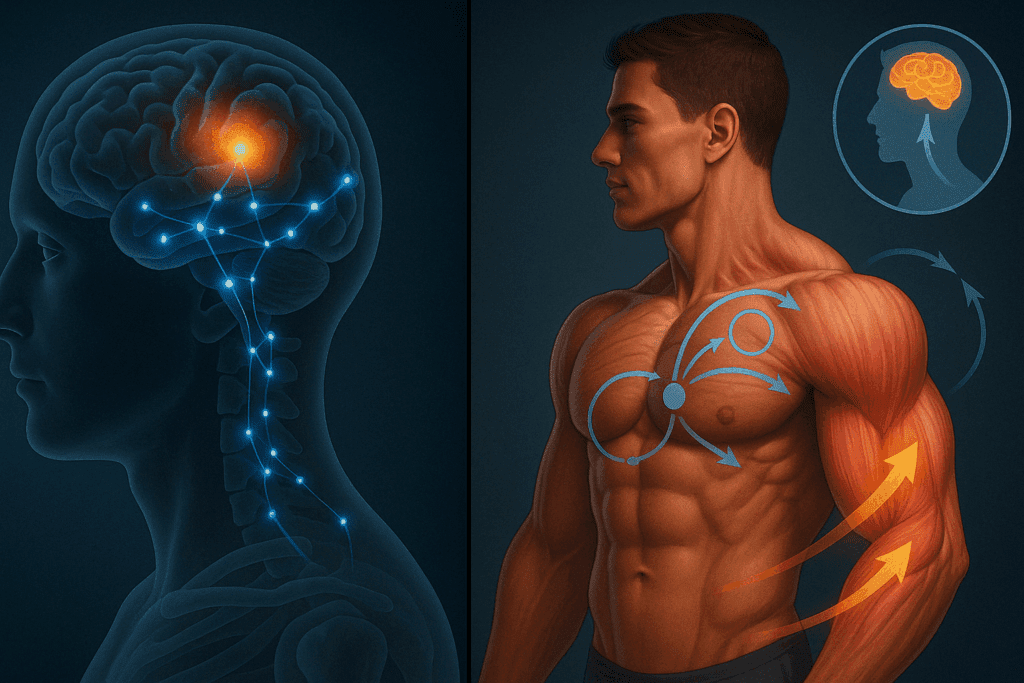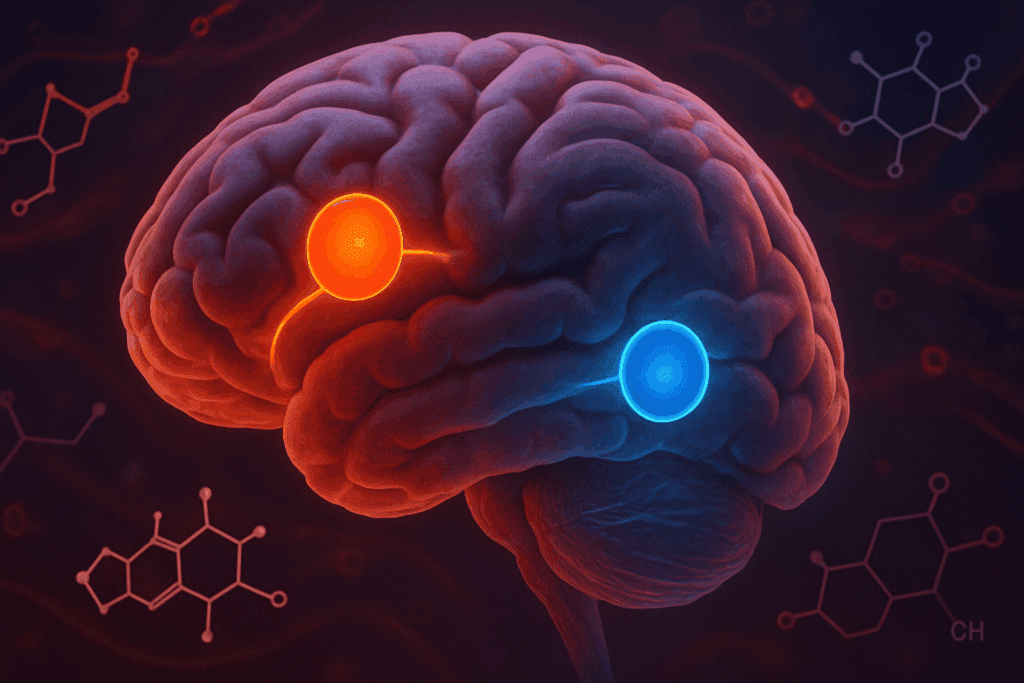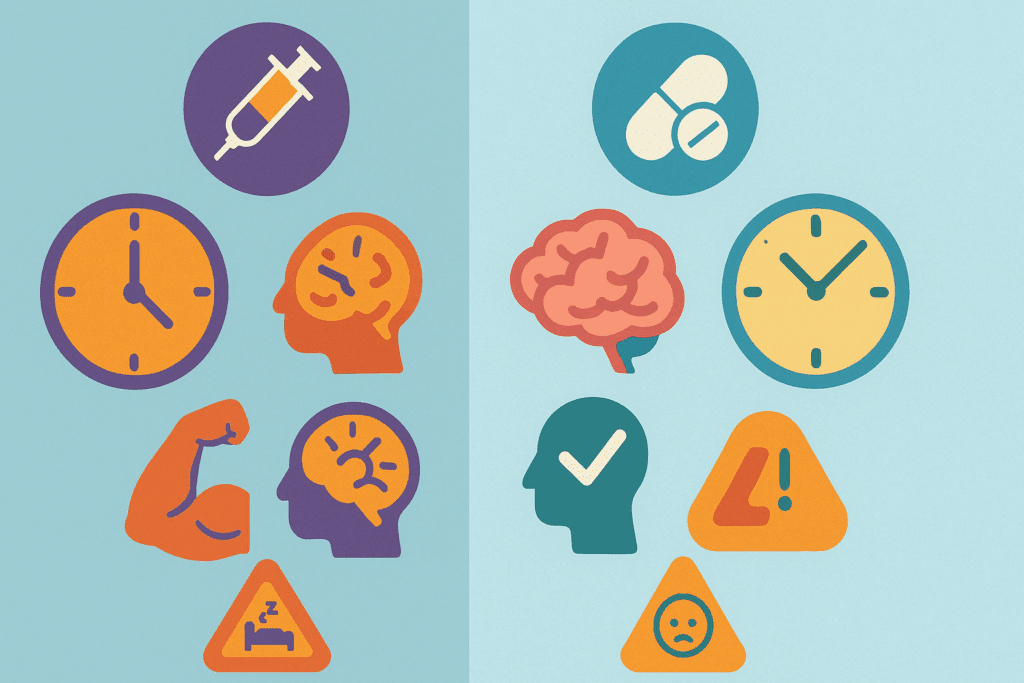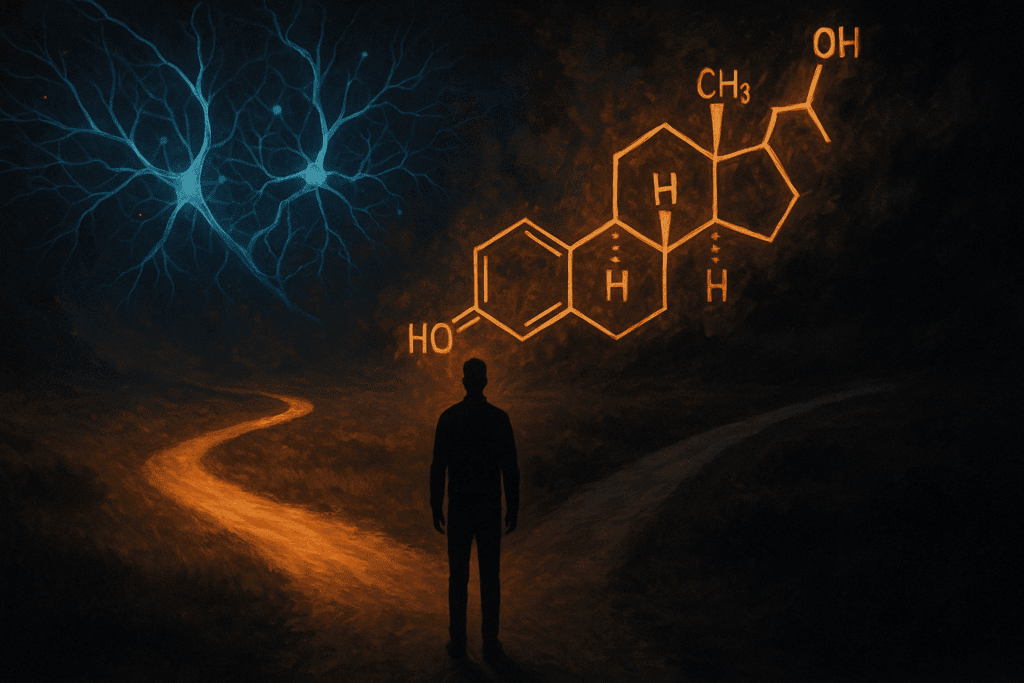Exploring the Question: Are Steroids Stimulant Drugs?
The intersection between cognitive enhancement, performance-driven nootropics, and traditional pharmacological agents like steroids raises a question that continues to provoke curiosity among health professionals, fitness enthusiasts, and cognitive biohackers alike: Are steroids stimulant drugs? While anabolic steroids are primarily known for their role in muscle growth and physical performance, an emerging interest in their possible effects on focus, mental stamina, and decision-making demands a more nuanced, science-based exploration. The distinction between cognitive stimulants and anabolic steroids may seem clear-cut at first glance, but when examined through the lens of neuropsychology, neurochemistry, and behavioral outcomes, the lines begin to blur.
You may also like: How to Choose the Best Brain Supplements for Adults: Science-Backed Ingredients That Support Focus, Memory, and Mental Clarity
To fully understand whether steroids fall under the umbrella of stimulant drugs, one must dissect what defines a stimulant versus what constitutes a steroid. Stimulants typically refer to compounds that act on the central nervous system to increase alertness, wakefulness, and often mood or motivation. In contrast, steroids are synthetic versions of hormones like testosterone, primarily designed to promote muscle synthesis and hormonal balance. However, the neuropsychological overlap—particularly when it comes to drugs that are good at modulating performance—can be profound. Some individuals even consider steroids a part of the broader “drugs gear” conversation, a term often used in athletic and bodybuilding circles to describe performance-enhancing regimens that go beyond basic supplementation.

Differentiating Stimulants and Steroids by Pharmacological Class
Stimulants such as amphetamines, methylphenidate, and modafinil work by enhancing the activity of neurotransmitters like dopamine and norepinephrine. These substances are typically prescribed for conditions such as ADHD or narcolepsy and are known for their fast-acting influence on mood, attention span, and executive functioning. Their mechanism of action often involves blocking the reuptake of these neurotransmitters or stimulating their release, resulting in heightened mental alertness and sometimes even euphoria.
Steroids, particularly anabolic-androgenic steroids (AAS), operate via an entirely different pathway. Rather than acting directly on neurotransmitter systems, they influence the expression of genes associated with muscle growth, red blood cell production, and, indirectly, behavioral traits. The hormonal changes induced by steroids do affect the brain, especially areas related to aggression, motivation, and even impulse control, but this does not make steroids stimulant drugs in the classical pharmacological sense.
Nevertheless, the overlap in user experience has led to confusion. Many who rely on “drugs gear” to boost physical performance also report increases in drive, energy, and assertiveness—qualities that are traditionally linked with stimulant use. While this could be attributed to the placebo effect, emerging neuroscience suggests that steroid use may have more than just muscular consequences.
The Psychological Effects of Steroids: More Than Muscle
While the medical community primarily prescribes steroids to treat hormonal deficiencies, certain chronic conditions, or muscle-wasting diseases, their off-label use in athletics has led to widespread anecdotal evidence of enhanced cognitive performance. Users of anabolic steroids often report increased focus, mental clarity, and even improved decision-making, particularly during the peak of a steroid cycle. But is this cognitive edge truly reflective of a stimulant-like effect?
One way to assess this is by exploring how steroids affect the limbic system and prefrontal cortex—two regions deeply involved in emotion regulation, impulse control, and executive function. Studies have shown that elevated testosterone levels can alter dopaminergic pathways, which are the same neural circuits affected by traditional stimulant drugs. This can lead to an increased sense of motivation and goal-directed behavior, though not necessarily improved cognition in the same way that prescription stimulants deliver.
Moreover, the behavioral changes often seen in long-term steroid users—such as risk-taking, heightened competitiveness, and aggressive decision-making—indicate that these drugs may influence cognition indirectly. This type of impact is especially relevant in high-pressure environments where decision-making optimization is key, whether in sports, business, or academia. In such settings, even a perceived cognitive advantage can be enough to encourage continued steroid use, reinforcing the belief that these are drugs that are good for more than just muscle building.
Neurochemical Impact of Steroids on Brain Function
While steroids do not fit the classic definition of stimulant drugs, their impact on neurotransmitters suggests they may share some downstream effects. Elevated testosterone levels are linked to increased dopamine synthesis, particularly in the mesolimbic pathway, a brain circuit involved in motivation and reward processing. This connection is critical in understanding why steroid use sometimes results in stimulant-like behavior patterns such as hyperfocus, elevated energy, and even insomnia.
Additionally, some steroids influence serotonin and GABAergic systems, both of which are crucial in mood regulation and emotional processing. This interplay may explain the emotional volatility sometimes associated with steroid cycles—ranging from heightened confidence and assertiveness to irritability and impulsivity. These mood shifts, although not classic stimulant effects, still alter cognitive functioning in ways that can either aid or impair decision-making, depending on dosage, duration, and individual neurobiology.
From a cognitive enhancement perspective, the neurochemical shifts caused by steroids may amplify certain types of executive functioning. For instance, short-term improvements in focus and task persistence may be observed, particularly in individuals with naturally low testosterone levels. However, the long-term impact is more complicated. Chronic use of steroids has been linked to cognitive deficits in memory, verbal fluency, and emotional regulation. Thus, while steroids may seem like drugs that are good for short-term performance, their utility in cognitive domains may come at a cost.

Performance-Driven Use: The Appeal of “Drugs Gear” for Mind and Body
In performance-focused subcultures—ranging from elite athletes to entrepreneurs in high-stakes industries—there is increasing interest in optimizing not just physical but also cognitive outputs. Within these communities, the phrase “drugs gear” has evolved to encompass a wide array of substances, from traditional anabolic steroids to nootropics, peptides, and metabolic enhancers. The blending of these pharmacological agents often includes both stimulants and steroids, creating a synergistic stack that users claim enhances both body and brain.
This growing trend speaks to the broader question of what constitutes enhancement. If a substance can sharpen focus, elevate mood, and improve decision-making under stress—even if not through traditional stimulant pathways—should it be grouped with drugs that are good for cognitive performance? The term “stimulant” may not be pharmacologically accurate in this context, but from a practical standpoint, users perceive real mental benefits, especially during intense training or demanding work periods.
What complicates the issue further is the individual variability in response. Some users may experience pronounced cognitive enhancement from steroids, particularly if they are addressing an underlying hormonal imbalance. Others may see negligible or even negative effects, such as increased anxiety or poor impulse control. This variability underscores the importance of a personalized, evidence-based approach when evaluating any substance for cognitive enhancement, especially those traditionally viewed as physical performance aids.
Steroid Use and Decision-Making Optimization: A Double-Edged Sword
When it comes to optimizing decision-making—a key focus of cognitive enhancement strategies—steroids present both potential benefits and serious drawbacks. On the one hand, increased testosterone and androgen levels have been linked to improved confidence, faster reaction times, and greater willingness to take calculated risks. In competitive settings, this can translate into better performance, faster strategic decisions, and improved resilience under pressure.
However, the downside lies in the potential for overconfidence, impulsivity, and reduced empathy. Research in behavioral neuroscience has shown that elevated androgen levels can impair the orbitofrontal cortex, a region of the brain associated with ethical reasoning and impulse control. In practical terms, this may result in decisions that favor short-term gain over long-term strategy, or aggressive tactics that compromise collaboration and judgment. These effects are not merely hypothetical; they are observed in both experimental studies and real-world cases of steroid abuse.
This duality makes steroid use particularly risky for those seeking to fine-tune their cognitive decision-making. While some may experience short-term gains in confidence and assertiveness, others may face deteriorating judgment, emotional instability, and a distorted sense of risk and reward. Therefore, despite their overlap with stimulant-like effects, steroids are best understood as a separate class of substances that influence cognition in a more indirect and potentially volatile manner.
Comparing Steroids to Stimulant Drugs in Cognitive Contexts
To answer the question “Are steroids stimulant drugs?” with precision, it’s necessary to examine direct comparisons with commonly accepted cognitive stimulants. Substances like Adderall, Ritalin, and modafinil are specifically designed to enhance attention, working memory, and task-switching capacity. They act rapidly, have well-defined dose-response curves, and show consistent effects across populations with ADHD, narcolepsy, and even healthy individuals seeking cognitive enhancement.
Steroids, on the other hand, lack this predictability. Their effects on cognitive function are less direct, slower to manifest, and heavily dependent on individual hormone profiles and psychosocial factors. While they may support decision-making in confidence-driven environments—such as sports competitions or business negotiations—they do not improve working memory, abstract reasoning, or sustained attention in the same clinically measurable ways that stimulants do.
Moreover, the risk profile differs significantly. Stimulants, when used under medical supervision, have well-established protocols for monitoring side effects, adjusting dosages, and mitigating long-term risks. Steroids, especially when used outside of a therapeutic context, often lack such safeguards. This increases the likelihood of adverse outcomes, both physiologically and psychologically. Therefore, while steroids may intersect with the realm of cognitive enhancement, they cannot be equated with drugs that are good for sustained cognitive optimization in the same reliable way as traditional stimulants.

Ethical and Legal Implications of Using Steroids for Cognitive Gains
As the line between physical and cognitive enhancement continues to blur, ethical questions about steroid use are gaining prominence. While stimulant drugs are often regulated through medical prescriptions with strict dosage guidelines, steroids are more loosely controlled in many regions, particularly when obtained through underground markets. The use of “drugs gear” without proper oversight raises not only legal but also moral concerns, especially when it involves individuals in competitive or high-stakes professional roles.
From an ethical standpoint, using steroids to enhance mental performance may give some individuals an unfair advantage in decision-making roles that affect others—such as leadership positions, investment management, or high-level negotiations. This is compounded by the fact that steroids can mask fatigue, reduce emotional sensitivity, and increase aggression—all traits that may influence the outcomes of critical decisions. In such contexts, the ethical ramifications of steroid use extend beyond personal health and into the realm of social responsibility.
In light of these concerns, a more nuanced framework for performance enhancement is needed—one that distinguishes between safe, evidence-based practices and risky, poorly understood interventions. This includes not only educating users about the limits of what steroids can achieve cognitively but also promoting transparency and regulation in all forms of enhancement, whether physical or mental.
FAQ: Understanding Steroids, Cognitive Function, and Stimulant Effects
1. Can anabolic steroids influence mood or decision-making long after stopping their use?
Yes, long-term effects on mood and decision-making can persist even after someone has stopped using anabolic steroids. This happens because steroids alter neurotransmitter systems like dopamine and serotonin, which regulate emotional regulation, impulse control, and executive function. While some users report a return to baseline over time, others experience prolonged irritability, anxiety, or even depressive symptoms. These changes might not qualify steroids as stimulant drugs outright, but they demonstrate significant influence on the brain’s reward circuitry—particularly in those with prolonged or high-dose exposure. For individuals seeking cognitive enhancement, relying on drugs that are good for long-term brain health—such as nootropics backed by clinical trials—may offer safer, more sustainable alternatives than traditional drugs gear.
2. Are there any differences in how steroids affect cognitive function in men versus women?
Absolutely. Hormonal balance plays a crucial role in how the brain processes cognitive tasks, and anabolic steroids can disrupt this balance in sex-specific ways. In men, excess testosterone from drugs gear can initially lead to increased energy and assertiveness but may also cause impulsivity or risk-taking behaviors. In women, the androgenic effects may manifest more as mood instability and verbal memory disruptions. These neuropsychological differences are especially relevant when asking is steroids a stimulant drug, as the answer may vary depending on individual hormone baselines. Understanding sex-based neurological responses can help identify drugs that are good for tailored cognitive enhancement without compromising mental health.

3. How do bodybuilders mentally justify the use of cognitive-enhancing steroids?
Many bodybuilders view cognitive benefits from steroids—like sharper focus or enhanced confidence—as part of the “mental edge” needed for peak performance. This psychological reinforcement can become a strong motivator, even outweighing concerns about side effects. In forums discussing drugs gear, it’s common to see users rationalize cognitive changes as positive adaptations rather than potential red flags. While they may not ask explicitly is steroids a stimulant drug, many perceive the increased alertness and aggression as proof of its stimulant-like qualities. However, these effects are often accompanied by mood swings or sleep disturbances, suggesting that the cognitive highs may come with significant trade-offs.
4. Are there any legal supplements that mimic the cognitive-enhancing effects of steroids without the risks?
Yes, several legal nootropics and adaptogens are gaining popularity for their ability to enhance mental clarity, focus, and motivation—without the hormonal disruption associated with anabolic steroids. Compounds like Rhodiola rosea, citicoline, and L-theanine offer evidence-based improvements in executive function and stress regulation. These are considered drugs that are good for cognitive health, especially for people looking to avoid the complications of traditional drugs gear. While they don’t deliver the dramatic physical transformations of anabolic steroids, they support sustainable, long-term brain health. For those asking is steroids a stimulant drug, these alternatives offer a clearer distinction: they enhance cognition without triggering the reward circuitry that leads to dependence.
5. Could stacking steroids with traditional stimulants increase the risk of psychological side effects?
Yes, stacking steroids with classic stimulants—like amphetamines or high-dose caffeine—can amplify neuropsychiatric risks. The combination can lead to heightened aggression, sleep disturbances, and even paranoia. Since both types of substances impact dopamine regulation and sympathetic nervous system activity, using them together can overstimulate the brain. While some athletes or high-achievers might stack drugs gear with stimulants for performance purposes, the risks often outweigh the perceived benefits. Instead of asking is steroids a stimulant drug in isolation, it’s more valuable to assess how these substances interact and affect long-term mental resilience. Safer performance-enhancing strategies should prioritize drugs that are good for both the body and the brain.

6. How might long-term steroid use affect cognitive aging and brain plasticity?
Emerging research suggests that chronic steroid exposure can impair brain plasticity—particularly in regions responsible for memory, emotional regulation, and executive decision-making. Over time, these changes may accelerate cognitive aging, leading to earlier declines in attention, working memory, and even social reasoning. In contrast, drugs that are good for brain plasticity—such as omega-3 fatty acids, BDNF-boosting supplements, and mindfulness-enhancing practices—have been shown to slow age-related decline. If the question is steroids a stimulant drug includes concerns about brain aging, the answer becomes even more complex, as the neurotoxicity risks accumulate silently over time. Prioritizing cognitive longevity over short-term enhancement is key for responsible biohacking.
7. Do steroids affect emotional empathy or social cognition in users?
Yes, there’s growing evidence that anabolic steroid use can blunt emotional empathy and reduce social cognition. Users often report a narrowed emotional range, difficulty reading others’ cues, and an increase in interpersonal conflicts. These effects can create long-term consequences in both personal and professional relationships. While these side effects aren’t typically discussed when people ask is steroids a stimulant drug, they reveal the deeper neurological costs of using drugs gear for cognitive or physical enhancement. In contrast, drugs that are good for social cognition—like oxytocin-enhancing strategies or mindfulness practices—foster empathy without emotional detachment.
8. Is there any evidence that steroids impair sleep quality and how does this impact cognition?
Yes, anabolic steroids have been linked to disrupted sleep patterns, including insomnia and reduced REM sleep. Sleep deprivation impairs memory consolidation, emotional regulation, and focus—all critical elements of healthy cognitive function. Even if users perceive increased energy during the day, the long-term consequences of poor sleep can negate any short-term gains. This becomes especially important in the context of is steroids a stimulant drug, since stimulants are also known to interfere with sleep. Prioritizing rest-supporting drugs that are good—such as magnesium glycinate or melatonin—can help restore sleep hygiene, particularly when weaning off drugs gear.
9. What role does impulsivity play in the decision to use cognitive-enhancing steroids?
Impulsivity is both a cause and consequence of steroid use in many individuals. Users seeking rapid transformation or performance boosts may underestimate the risks due to impaired risk assessment. Over time, steroids can worsen impulsive behavior by altering prefrontal cortex function, leading to more erratic decisions in both athletic and non-athletic domains. When evaluating is steroids a stimulant drug, it’s worth noting that both stimulants and steroids share the capacity to disrupt inhibitory control. Addressing this issue requires replacing drugs gear with drugs that are good for long-term self-regulation—such as dopamine-modulating adaptogens or cognitive-behavioral interventions.
10. Could future neuroscience create safer steroid alternatives that enhance both physical and cognitive performance?
It’s a promising possibility. Researchers are already exploring selective androgen receptor modulators (SARMs) and neurosteroid analogs that could offer the benefits of steroids without the full range of side effects. These compounds may one day provide targeted performance enhancement without suppressing natural hormone levels or impairing brain health. Additionally, advances in precision medicine could help customize brain-enhancing protocols based on genetic and hormonal profiles. Rather than debating is steroids a stimulant drug, future innovation may shift the focus toward hybrid compounds that function as drugs that are good for both muscular development and cognitive clarity—without the volatility of current drugs gear.

Final Thoughts: Understanding the Cognitive Boundaries of Steroids
In the quest for better performance, whether on the field, in the boardroom, or at the academic desk, the tools we use matter. While the term “drugs gear” may casually group steroids with a wide range of performance-enhancing substances, it’s crucial to differentiate between mechanisms, outcomes, and risks. Steroids are not stimulant drugs in the classical sense, but their influence on brain function—particularly in areas related to motivation, emotion, and aggression—can mimic some stimulant-like outcomes.
For individuals looking to enhance focus, resilience, and decision-making under pressure, it’s important to critically evaluate whether steroids are truly drugs that are good for cognitive performance or merely perceived to be. While short-term improvements may be appealing, they often come at the cost of long-term stability and ethical clarity. Understanding these distinctions can help users make informed, responsible choices about what substances they introduce into their bodies—and minds.
In the end, the question isn’t just Are steroids stimulant drugs? but rather, What are we really seeking when we reach for enhancement—and at what cost? Through a deeper understanding of how these compounds affect our biology and our decisions, we can navigate the complex landscape of cognitive optimization with greater wisdom and integrity.


